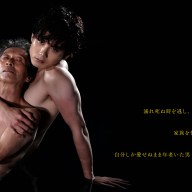Okwui Okpokwasili in Andrew Rossi’s documentary “Bronx Gothic,” based on the Nigerian-American’s performance artist’s show of the same name. | GRASSHOPPER FILM
A few weeks ago, Sofia Coppola’s “The Beguiled” became the subject of a huge controversy over racism, not for any stereotypical treatment of African Americans within the film itself but because it omits the subject of slavery despite its Civil War setting. A lot of lively debate followed, unfortunately accompanied by the kind of defensiveness and bluster that show the limits of 140 characters for addressing complex subjects with the nuance they deserve.
While also made by a white person, Andrew Rossi’s “Bronx Gothic” depicts the life of a black woman with all the three-dimensional perspective social media seems incapable of right now. Rossi’s subject is Nigerian-American performance artist Okwui Okpokwasili, and he documents her three-month tour of the title show.
Rossi, who also collaborated on the film’s editing and cinematography, makes his presence felt stylistically. The editing has a very personal feel, relying heavily on multiple superimpositions. Rossi also cuts from Okpokwasili’s performances to scenes of her daily life, such as doing laundry. He never shows particularly long sections of her work, and he repeats certain segments, such as a reference to Nathan’s Hot Dogs, over and over again. Okpokwasili’s piece combines elements of theater and dance, telling the story of the friendship of two girls in the Bronx.
“Bronx Gothic” steps back to let performance artist Okwui Okpokwasili have her say
Rossi knows when to shut up and let his subject speak for herself, and he does so for most of the film. Okpokwasili explains her views about the difficulties of being a “brown girl” — her preferred phrase — at length. Her “Bronx Gothic” is not autobiographical, but it’s based on experiences she observed growing up in the Parkchester neighborhood of the Bronx in the ‘80s. In its view of sexual pleasure and abuse, it’s been compared to Toni Morrison’s novel “The Bluest Eye.” Ironically, what Okpokwasili says about the dangers of teenage girls’ sexual ignorance actually has many points of contact with Coppola’s “The Beguiled.”
Okpokwasili’s performance is both extremely physical and sexually frank. In it, she reads a letter, inspired by a real one she was given as a girl, describing very explicit experiences. She gets down on the ground and thrusts her body against it. But she does all this on her own terms, in a way that never allows the audience to objectify her. If anything, she treats the audience aggressively; in fact, she speaks about her spit and sweat landing on them. Rossi films her at home talking about how black bodies are casually murdered and thrown away in America. “Bronx Gothic” testifies to her determination not to allow herself to become one of them, if she has any control over it.
There’s one point where I wish both Rossi and Okpokwasili had probed further. Rossi shows images of the audiences for her tour, and with the exception of her closing night performance in the Bronx, they’re mostly, although not entirely, white. She addresses this occasionally, at one point pondering, “Is my blackness getting on you?” But the film essentially ignores the irony of her celebration of black womanhood playing to audiences for whom it’s not a shared experience, even though it shows her talking with groups of audience members largely composed of women of color afterwards. “Bronx Gothic” would be a stronger film if it explored further how Okpokwasili might feel about sharing her work with people who don’t have a direct connection to it and, at worst, might be voyeurs.
At the same time, it’s saying something about the experience of growing up female in America that most women could probably relate to. These levels are tricky, and the film mostly ducks them.
All that said, “Bronx Gothic” (both Rossi’s and Okpokwasili’s) deserves a lot of credit for fearlessly tackling subject matter that no American film I’ve seen this year — with the exception of Jordan Peele’s obviously much different “Get Out” — has addressed. New York’s arthouse audiences can be amazingly vanilla, but earlier in 2017 Film Forum’s lengthy run of Raoul Peck’s “I Am Not Your Negro” attracted a diverse house. Okpokwasili obviously doesn’t have James Baldwin’s name recognition, but I hope some of that audience returns for “Bronx Gothic.”
BRONX GOTHIC | Directed by Andrew Rossi | Grasshopper Film | Opens Jul. 12 | Film Forum, 209 W. Houston St. | filmforum.org



































